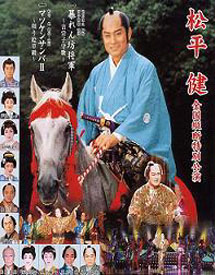 Chronicle in Praise of Yoshimune: The Bold Shogun (Yoshimune hyobanki: Abarenbo Shogun, 1978-1982) was the title of a television series starring Ken Matasudaira as the eighth Shogun, Tokugawa Yoshimune (1684-1751), who according to legend hobnobbed secretly with the lower classes in order to punish the villainous & reward the good & meak.
Chronicle in Praise of Yoshimune: The Bold Shogun (Yoshimune hyobanki: Abarenbo Shogun, 1978-1982) was the title of a television series starring Ken Matasudaira as the eighth Shogun, Tokugawa Yoshimune (1684-1751), who according to legend hobnobbed secretly with the lower classes in order to punish the villainous & reward the good & meak.
The title was eventually streamlined to Abarenbo Shogun producing over 838 episodes (more counting feature-length specials) in twenty-five years, airing its final episode in 2003. It was one of the longest-running television shows in Japan.
Having started out as a teenage singing idol, Matsudaira isn't easily taken seriously as an actor, & less so when he sings folksy pop songs in some of the episodes. Though beloved by a vast number of fans, he always strikes me as the acting equivalent of Fabian or Frankie Avalon.
There's really no American equivalent, but if Paul Anka had been the star of a western tv series in the 1970s & it was still on at the turn of the millenium, there you'd almost have the equivalent of Ken Matsudaira if Paul or Frankie or Fabian's hero wasn't just a cowboy or marshall, but Abe Lincoln himself, journeying incognito through the west solving crimes & righting wrongs.
Y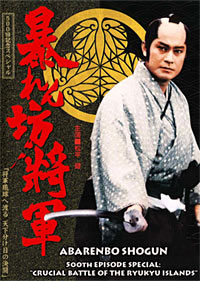 oshimune probably was one of the least harmful of all Tokugawa Shoguns, but all things are relative where dictators are concerned. He encouraged education, but only for the samurai class. He grabbed increasing power to the central government, undermined regional authorities under the guise of reform that were merely reactionary, confiscated lands & fortunes to bolster the bankrupt government in Edo & increase the prestige of the bakufu. oshimune probably was one of the least harmful of all Tokugawa Shoguns, but all things are relative where dictators are concerned. He encouraged education, but only for the samurai class. He grabbed increasing power to the central government, undermined regional authorities under the guise of reform that were merely reactionary, confiscated lands & fortunes to bolster the bankrupt government in Edo & increase the prestige of the bakufu.
He strengthened the military government upon the forced labor & agricultural taxation of peasants & shop owners, while eradicating the debts of his own samurai class. His reliance on sukego or enslavement of peasants was extreme, & any farmer who owned or bred horses was at risk of Yoshimune having his stock taken away for distribution among samurai.
In consequence, Edo the military capital began to flourish anew, & samurai strutted more proudly than ever. But in rural areas of Japan there was poverty & constant unrest among the common people. Yoshimune was absolutely no friend to the poor or victims of injustice. So his legend is a wild fabrication.
But fabrication is what film tends to be all about. Regarded by some as classic televison jidaigeki, I'm not among Abarenbo Shogun's admirers. The series is tra-la-la upbeat with happy-happy joy-joy smiles, while promoting the miraculously moronic notion that dictators like to hobnob with the common masses & would never do injury to anyone decent. Incidents with these stories are cliche. Action is too expensive to include much. So episodes are very, very talky. When half-moments of swordplay do erupt, the choreography is unvaryingly awful.
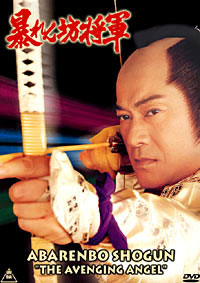 Abarenbo Shogun V: Avenging Angel (1993) was a feature-length telefilm rather than just another episode.
Abarenbo Shogun V: Avenging Angel (1993) was a feature-length telefilm rather than just another episode.
But the sappy telefilm music, the full-frame dimensions, & general tone were indistinguishable from "mere" episodes, meaning this "movie" is nowhere near cinematic.
As the tale opens, a woman assassin is taking down an enemy, just to insure immediate color & aaction. There follows long dreadful exposition about affairs of state, counterfeiting, & whatnot, until the Shogun himself gets directly involved.
I'm a sucker for swordswomen characters having myself studied iaido, so the street-festival sequence with the girl dressed as a boy doing entertainment schtick with sword was fun for me, though the choreography was too horrible to make her impressive.
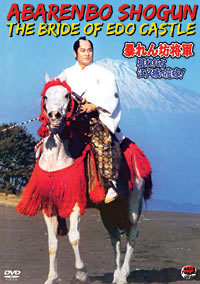 Chizuru (Azusa Nakamura), the female assassin, is on a mission of revenge for her wrongly crucified family. Chizuru (Azusa Nakamura), the female assassin, is on a mission of revenge for her wrongly crucified family.
Her mission & the government's investigation of counterfeiting intersect, in that the shogunate needs some of these bad men alive to give evidence, but Chizuru just wants to kill them.
The telefilm, like the usual episodes, ramins talky & cliche, with that relentless annoying score a bigger killer than Chizuru.
Last I checked, portions of seasons one through eight were available subtitled in the grey market in multi-disc sets.
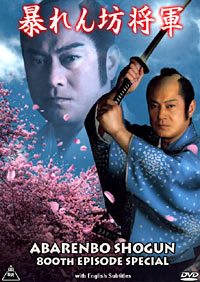 Additionally, the following telefilm specials have been subtitled & distributed unofficially through the grey market: Additionally, the following telefilm specials have been subtitled & distributed unofficially through the grey market:
Abarenbo Shogun: 500th Episode Special ( Abarenbo Shogun Sakigake Ban, 1990) finds our Shogun heading off for the Ryukyu Islands to ward off a plot against the shogunate.
In Abarenbo Shogun: The Bride of Edo Castle (Abarenbo Shogun IV: Supesharu, 1991) the Shogun gets engaged to a princess who rebels against the prospect, because she wasn't consulted.
Abarenbo Shogun: 800th Episode Special (Abarenbo Shogun 800-Kai Kinen Shinshun Supesharu, 2001) the Shogun has to fight to regain control of Edo Castle.
Occasionally a television series really can be recommended to film fans, as with Kinnosuke's seasons of Long Wolf with Child or Shintaro Katsu's for-tv seasons of Zatoichi. But where Abarenbo Shogun is concerned, strictly for fans of period soap operas.
copyright © by Paghat the Ratgirl
|
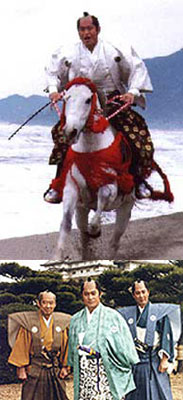

 oshimune probably was one of the least harmful of all Tokugawa Shoguns, but all things are relative where dictators are concerned. He encouraged education, but only for the samurai class. He grabbed increasing power to the central government, undermined regional authorities under the guise of reform that were merely reactionary, confiscated lands & fortunes to bolster the bankrupt government in Edo & increase the prestige of the bakufu.
oshimune probably was one of the least harmful of all Tokugawa Shoguns, but all things are relative where dictators are concerned. He encouraged education, but only for the samurai class. He grabbed increasing power to the central government, undermined regional authorities under the guise of reform that were merely reactionary, confiscated lands & fortunes to bolster the bankrupt government in Edo & increase the prestige of the bakufu.
 Chizuru (Azusa Nakamura), the female assassin, is on a mission of revenge for her wrongly crucified family.
Chizuru (Azusa Nakamura), the female assassin, is on a mission of revenge for her wrongly crucified family. Additionally, the following telefilm specials have been subtitled & distributed unofficially through the grey market:
Additionally, the following telefilm specials have been subtitled & distributed unofficially through the grey market: